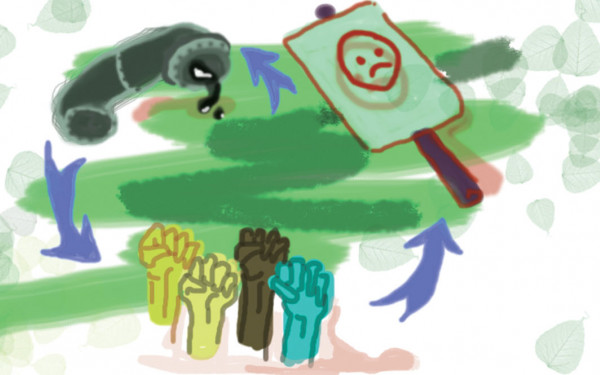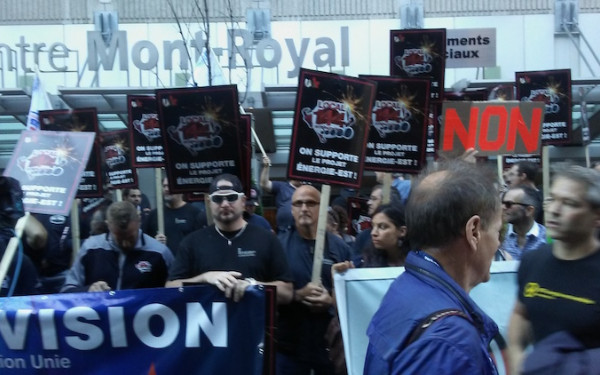There’s No Such Thing as Green Fascism
Quebec’s Environmental Movement Needs to Take a Stand Against the Far-Right
The environmental movement in Quebec is at a decisive moment in its history.
We’re on the heels of what might be the movement’s biggest victory ever—the cancellation of the Energy East pipeline. After years of movement-building and struggle, we’ve developed a powerful coalition that’s capable of challenging and defeating the infrastructure projects that threaten the stability of life on earth. For that, we should be proud.
But Quebec’s environmental movement doesn’t exist on its own, in a silo. It is one piece of a broad tapestry of transformative social movements in the province, and is networked with a global movement against climate change. These coalitions are built on the assumption that, while each movement might focus on different issues, all of the struggles contribute to transforming society in favour of greater fairness and justice.
This framework, which must necessarily underpin any effective environmental movement, was called into question by events this weekend.
On Saturday, participants of the environmental movement staged a demonstration in Quebec City. It was called “Quebec’s Water is Sacred,” and was meant to be a protest against Bill 106, a provincial law which gives oil and gas companies the power to expropriate land from individuals who resist oil exploration on their property.
In the leadup to the demonstration, it became known that Storm Alliance—the self-described “ultranationalist” group known for holding protests against refugee camps at the Canada-US border—was planning to attend. When anti-racist activists brought this to the attention of the environmental organizers, a note was added to the Facebook event stating that the demonstration was “for everyone, regardless of political allegiances and political ideals.”
This attitude represents an open invitation for the racist far-right to contribute to the environmental movement.
Alex Tyrrell, the head of the Green Party of Quebec, had been invited to speak at the demonstration. After learning that Storm Alliance planned to attend, he announced that he was boycotting the demonstration.
“The far-right has been openly saying that they are looking to gain influence in Quebec politics,” Tyrrell said to The Link. “So this is a way for them to increase their influence.”
“As soon as you open the door to the far right, they start taking more and more space, and it gives them legitimacy.”
Tyrrell said that because Storm Alliance was not immediately denounced by the organizers, people of colour and minorities would not feel welcome at the demonstration.
The organizers did eventually issue an extremely weak condemnation of “racists,” without explicitly naming Storm Alliance. The group’s leader, Dave Tregget, said that they would no longer be attending the rally. But on the day of the demonstration, they posted a group photo to Facebook which implied that they had attended the rally without flying their banners.
The Camp de la Riviere—a protest encampment currently resisting fracking in Gaspesie—released a press release denouncing the organizers’ lax attitude when dealing with the far-right. Other environmentalists took to the event’s Facebook page and denounced the organizers for giving space to Storm Alliance.
Alexander Reid Ross, author of Against The Fascist Creep, told The Link that environmental movements have historically been vulnerable to fascist co-optation, because the movement has traditionally missed a key quality that guards against fascism.
“Movements need to hold equality as a key value to be considered left-wing,” he said, “otherwise you have a left-right syncretic movement, and that’s where fascism thrives.”
The struggle against climate change must be intersectional to address the magnitude of the problems we face. In Canada, environmental destruction is a direct result of centuries of colonial displacement of indigenous people. Globally, climate disruption will mean increased migration and climate refugees, mostly coming from the poor countries of the Global South. The rich countries of the North, including Canada, are most responsible for climate change, and have a responsibility to take in those displaced by the crisis. None of this is compatible with the ideologies of the far-right.
“These people are not brought together in their far-right groups by a desire for environmental justice,” Tyrrell said. “They’re brought together by a hatred of minorities.”
The organizers of Saturday’s demonstration used the language of inclusivity to justify their weak stance against a group that would, if given the power to do so, exclude huge swaths of Quebecois society. They used the language of coalition-building to justify the presence of a group that de facto prevents others from joining the coalition for climate justice.
We live in a time when fascism is, once again, on the rise worldwide. These organizations seek to gain power and legitimacy by latching onto existing movements, and co-opting them. They attempt to reframe social problems—such as environmental destruction or austerity—as being caused by scapegoats such as Muslims or migrants, rather than being caused by systems of power.
Reid Ross said that far right movements seek to gain a foothold in movements, then transform them. He gave the example of the Maidan protests in Ukraine, which had a liberal character in the beginning but were taken over by far-right nationalists. Far-right outfits in the United States, such as the Wolves of Vinland, are attempting to take over the environmental movement.
“So any movement that’s populist needs to be distinctly aware of this danger,” he said. When asked how the environmental movement can guard against fascist infiltration, Reid Ross said that “the only way is to expel them, and not give them the space to organize.”
“Kick them out of your organizations, and if they form their own organizations in the movement, then oppose them vocally—as well as everywhere else.”
If the environmental movement truly wants to challenge those systems that lead to climate change and environmental destruction, it must take a stand against the far right. We must resist all attempts by the far-right to take up space within our movements. Groups like Storm Alliance aren’t interested in protecting the environment, they’re interested in cynically using any avenues to gain political power.
We can’t let any of our movements become those avenues. The environmental movement must be anti-racist, anti-colonial, and feminist. Otherwise, who are we doing it for?

_900_439_90.jpg)





